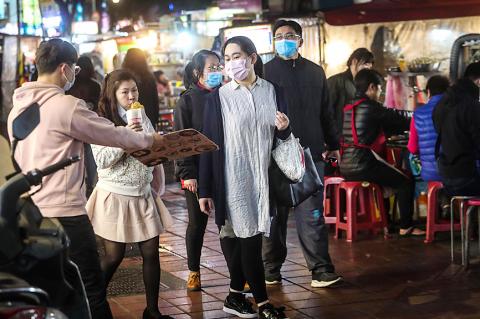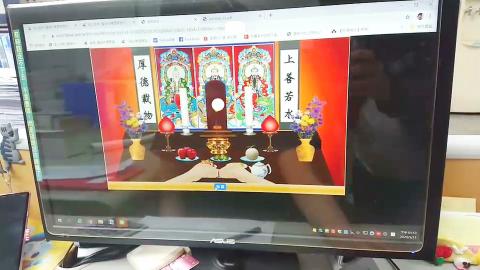The Executive Yuan is mulling additional coupons to revitalize sectors hit by COVID-19 that do not require people to stay at a hotel or bed-and-breakfast (B&B) before they can use the coupons, and the budget for the coupons would exceed the NT$2.3 billion (US$76.29 million) already earmarked, Minister Without Portfolio Kung Ming-hsin (龔明鑫) said yesterday.
The Ministry of Economic Affairs had budgeted NT$2 billion for the coupons, which was raised to NT$2.3 billion after the Ministry of Culture’s plans were included.
Under the Executive Yuan’s current plan, each Republic of China (ROC) citizen would receive NT$800 worth of coupons when they stay at a hotel or B&B, which can be used at night markets, other markets, shopping districts and cultural and art venues, Kung said.

Photo: CNA
Asked by reporters whether the government plans to issue coupons that could be used without having to present proof of a hotel stay, as previous tourism-industry booster coupons linked to hotel and B&B stays did, Kung said that the possibility was under consideration.
If additional coupons were to be introduced, the budget would exceed what has been earmarked, he said, although he declined to provide any specifics.
Asked when the coupons would be distributed, Kung said when the Central Epidemic Command Center (CECC) deems it suitable for people to go shopping.

Photo: Hung Jui-chin, Taipei Times
Later in the day, the Ministry of Culture said in a statement that its coupons, which would have a face value of NT$200, would not be bound to hotel stays.
Its coupons would be redeemable at more than 10,000 venues, stores and performances nationwide — including movie theaters, record and bookstores, and concert venues — and when purchasing tickets via nine online ticket booking services, which have teamed up with more than 6,700 local performing groups, it said.
In related news, the Executive Yuan green-lit eight sets of regulations to complement the Special Act on COVID-19 Prevention, Relief and Recovery (嚴重特殊傳染性肺炎防治及紓困振興特別條例), each tendered by a central government agency, as well as three accompanying regulations laid down by the Ministry of Health and Welfare.
The complementary rules include qualifications for businesses eligible for compensation, while the regulations set the daily compensation for people quarantined or taking care of quarantined family members at NT$1,000.
Employers who voluntarily pay workers who are quarantined or on leave to take care of a quarantined family member would receive an income tax break equivalent to twice the salary payout during the quarantine period.
People who are convicted of hoarding resources that the CECC has deemed as necessary for containing the COVID-19 outbreak or those who drive up the prices of such items could face a prison sentence of up to five years.
The health ministry on Wednesday declared N95 respirators an item necessary for COVID-19 prevention efforts, and more items could be added at the ministry’s discretion, Minister Without Portfolio Lo Ping-cheng (羅秉成) said yesterday.

Taiwan has received more than US$70 million in royalties as of the end of last year from developing the F-16V jet as countries worldwide purchase or upgrade to this popular model, government and military officials said on Saturday. Taiwan funded the development of the F-16V jet and ended up the sole investor as other countries withdrew from the program. Now the F-16V is increasingly popular and countries must pay Taiwan a percentage in royalties when they purchase new F-16V aircraft or upgrade older F-16 models. The next five years are expected to be the peak for these royalties, with Taiwan potentially earning

POSITIVE DEVELOPMENT: Japan and the US are expected to hold in-depth discussions on Taiwan-related issues during the meeting next month, Japanese sources said The holding of a Japan-US leaders’ meeting ahead of US President Donald Trump’s visit to China is positive news for Taiwan, former Japan-Taiwan Exchange Association representative Hiroyasu Izumi said yesterday. After the Liberal Democratic Party’s landslide victory in Japan’s House of Representatives election, Japanese Prime Minister Sanae Takaichi is scheduled to visit the US next month, where she is to meet with Trump ahead of the US president’s planned visit to China from March 31 to April 2 for a meeting with Chinese President Xi Jinping (習近平). Japan and the US are expected to hold in-depth discussions on Taiwan-related issues during the

‘LIKE-MINDED PARTNER’: Tako van Popta said it would be inappropriate to delay signing the deal with Taiwan because of China, adding he would promote the issue Canadian senators have stressed Taiwan’s importance for international trade and expressed enthusiasm for ensuring the Taiwan-Canada trade cooperation framework agreement is implemented this year. Representative to Canada Harry Tseng (曾厚仁) in an interview with the Central News Agency (CNA) said he was increasingly uneasy about Ottawa’s delays in signing the agreement, especially as Ottawa has warmed toward Beijing. There are “no negotiations left. Not only [is it] initialed, we have three versions of the text ready: English, French and Mandarin,” Tseng said. “That tells you how close we are to the final signature.” Tseng said that he hoped Canadian Prime Minister Mark Carney

STAY IN YOUR LANE: As the US and Israel attack Iran, the ministry has warned China not to overstep by including Taiwanese citizens in its evacuation orders The Ministry of Foreign Affairs (MOFA) yesterday rebuked a statement by China’s embassy in Israel that it would evacuate Taiwanese holders of Chinese travel documents from Israel amid the latter’s escalating conflict with Iran. Tensions have risen across the Middle East in the wake of US and Israeli airstrikes on Iran beginning Saturday. China subsequently issued an evacuation notice for its citizens. In a news release, the Chinese embassy in Israel said holders of “Taiwan compatriot permits (台胞證)” issued to Taiwanese nationals by Chinese authorities for travel to China — could register for evacuation to Egypt. In Taipei, the ministry yesterday said Taiwan